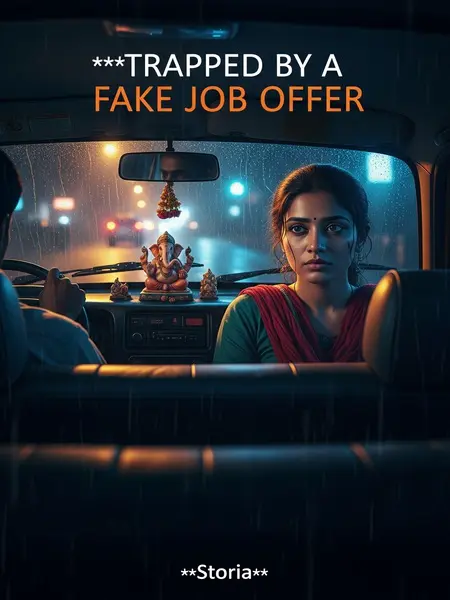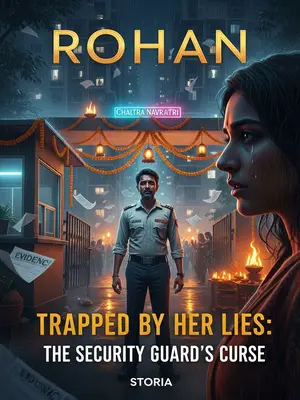Chapter 2: The Outskirts
Google Maps showed we were getting closer and closer. The blue dot inched across a patch of grey on the map, my heartbeat quickening in rhythm with the countdown. Each kilometre took us deeper into the outskirts, where even auto-walas refuse fares after sunset.
Only fifteen minutes left. The numbers on the dashboard seemed to mock me. I glanced at the ticking clock, and the empty road ahead—no office complex, no shops, just scrubland and the odd factory, shutters down for the holidays. The silence was broken only by the whine of a distant generator and the faint smell of burning leaves drifting through the cracked window.
This place was so remote—even for a few extra hundred rupees, most locals wouldn’t dare come here at night. Any driver in the city will tell you: this stretch is infamous for robberies and accidents. Even police patrols avoid it. I thought of my daughter at home, the loan EMI, and the little box of kaju katli I’d promised for New Year. What madness brought me here?
But this girl? She was actually going here for a job interview. No hesitation, no second thought—just pure ambition shining in her eyes. I wondered if anyone in her family had ever set foot this far outside the city. Her courage—or maybe innocence—made me shake my head.
She looked both eager and anxious, face almost glowing with anticipation. Her hands fiddled with the strap of her bag, and now and then she’d check the WhatsApp DP of her boyfriend, drawing strength from his smile. Her lips would part in a half-smile, then press together nervously. Hope, and a little fear, danced in her eyes.
Her voice, thick with a local accent, tried to sound like proper Hindi but kept stumbling. She mimicked news anchor tones, but her village lilt slipped through. Sometimes she slipped into Telugu with her boyfriend, or mumbled broken English to sound impressive. It was both endearing and heartbreaking.
I kept sneaking glances in the rearview mirror, worried. My conscience nagged—should I step in, or mind my own business? She looked so fragile, almost like a sparrow venturing out alone. I thought of my sister’s first day at work in Bangalore, her call full of tears. The urge to protect this stranger grew with every kilometre.
She looked delicate—thin, small-framed. She wore black formal trousers, a bit too long, paired with a white shirt tucked in awkwardly, and a faded shawl for warmth. Her knees shivered in the draft, but she sat up straight, crossing her legs like a heroine from an Instagram reel. The shirt was too loose, probably borrowed, and the trousers nearly dragged on the floor. The shawl looked like something from her mother’s wedding trunk, with a few pulled threads.
Anyone could tell she was copying a look from a reel, hoping to pass for a city professional. But her whole outfit—local bazaar or Myntra—couldn’t have cost more than a thousand rupees. She kept smoothing her shirt, checking her phone’s reflection, pulling her trousers down when she thought I wasn’t looking. The innocence hurt my heart. Maybe she’d spent her Diwali bonus on this look, hoping to fit in.
Her fingers drummed on a faded Skybags backpack, bulging at the seams—probably stuffed with certificates, resumes, a steel dabba, and maybe a change of clothes. The faded logo of a coaching centre was barely visible.
Her face was pure innocence—big glasses perched on her nose, hair tied in a high ponytail. She looked like the front-row type, always raising her hand, never talking back. The glasses kept slipping, and she’d push them up with a nervous tic. Stray hair framed her face, making her look even younger. She kept tucking it behind her ear, the jasmine oil scent carrying me back to school days in Secunderabad.
She was on her phone the entire ride—tapping, typing, checking blue ticks, scrolling through calls. She must have called her entire extended family, updating everyone from a cousin in Vizag to a best friend in the next lane.
Calling her boyfriend, mother, and some so-called higher-up who arranged the interview. The calls followed a pattern: a quick update to the boyfriend, a longer call to her mother—'Khaana khaya ki nahi, beta?'—and back to the 'contact' who spoke in clipped, businesslike Hindi. His deep voice gave vague assurances—'Just come, you’ll see. Trust me, beta.' I didn’t like the sound of him at all.
I couldn’t get a word in. Between calls, she’d flash a polite smile, then look away. Even when I asked where exactly we were going, she just waved her hand—'Map mein dikha raha hai, bhaiya, bas seedha le chalo.'
Honestly, I cursed in my heart—these days, young women are too easy to fool. How can anyone trust a stranger with their life for a job offer that sounds too good to be true? Maybe I was being unfair. Maybe she was just desperate, or never taught to doubt. My anger was more at the world that preyed on girls like her.
On New Year’s Eve, taking an unregistered cab to a job interview in the middle of nowhere—and not even the least bit suspicious. Not a hint of fear in her voice as she told her mother, 'Bhaiya is taking me, it’s all safe.' Sometimes I think our country raises girls to be brave, but forgets to teach them to be careful. Even I wouldn’t bring my own sister here at this hour.
And the craziest part? Her family and boyfriend didn’t see any problem either. Everyone just cheered her on, told her not to lose hope, even joked about what she’d buy with her first salary. The boyfriend promised a Goa trip, the mother whispered a prayer and told her to bring laddoos for the neighbours. Not one person asked for the address or worried about the timing. This made my heart sink most of all.
They sounded genuinely happy, thinking she’d landed a great job. For a moment, I felt sad for them—this was their one shot, their chance to climb out of struggle, and they wanted so badly to believe in a miracle. How many times have I seen families like this, holding onto hope, refusing to see the danger?
Do they even realise how bad the job market is? I remembered the news—firings everywhere, freshers running pillar to post for interviews that never happen. Everyone’s struggling, but no one wants to admit it. Easier to believe in fairy tales than face reality.
Sixty thousand a month, plus PF, ESI, housing, meals—offers you only see in WhatsApp forwards. Still, the way she said it, like she’d already made it, filled me with a strange mix of envy and worry. If jobs like this existed, half of Hyderabad would be in line.
Heh. And here I am—a proper graduate from one of India’s best colleges, and my salary got slashed by forty percent this year. The irony wasn’t lost on me. All my sacrifices—late-night studies, entrance exams, hostel fees—and here I was, overtaken by someone with just a polytechnic diploma. My old batchmates in our WhatsApp group 'Poly Batch 2018' would have a field day with this story, especially as New Year wishes started lighting up the chat.
To cover the EMI and save for my daughter’s formula, I work a day job and drive an illegal cab at night. I could picture my wife’s tired face at the kirana, counting coins, the tin box where we saved for the next vaccination. This wasn’t the life we imagined, but what else to do? You have to survive, na. Even if it means risking everything for a little extra cash.
Even working through New Year, running myself ragged, I barely make fifteen thousand a month. Everyone’s feeling the pinch. Onion prices, school fees, electricity bills that come even during power cuts—it feels like the world wants to break our backs. But who will listen to our story?
So what does that make me? Am I a fool, grinding away while others get rich on dreams? Is this life—slogging for crumbs while others walk into fortune with nothing but a smile and a fake reference?
If this company isn’t a scam, I’ll write my name Rakesh Sharma backwards. I muttered it under my breath, half-joking, half-angry. My old English teacher would have laughed, but it felt good to say something, even if only to myself.
Listening to all this, I grew more and more irritated. I’ve met my share of foolish people, but this girl and her family were something else. Maybe it was exhaustion, maybe helplessness—I started grinding my teeth. People like me beg for every paisa, and here they were, walking into a scam with eyes wide open. If only the world was really so simple.
I tapped the brake, slowing from sixty to forty. Let the ride last a little longer, I thought. Maybe she’ll realise something’s wrong, maybe someone wise will call. But nothing happened—she just kept chatting, oblivious.
Trying to stretch the ride, buying time to think of what to do. Maybe if I could convince her to turn back, I’d save myself a lifetime of guilt.
When she finally finished her second call to her boyfriend—in full local dialect—I jumped in before she could dial again. I cleared my throat, trying to sound casual, heart thumping. I tried to sound like the big brother in every family WhatsApp group. I chose my words carefully.
'Arrey, behenji, who goes for a job interview on New Year’s Eve at night? Isn’t this obviously a scam?' I added a little laugh, trying to keep it light. But inside, I was pleading—please, just listen once, na.







